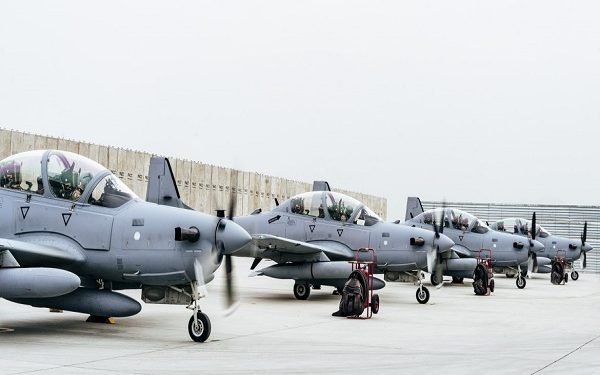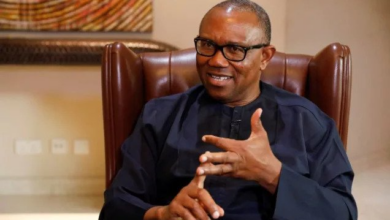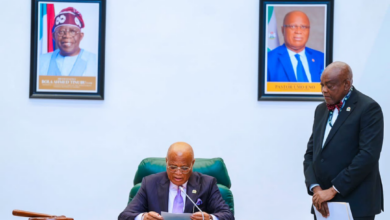Insurgency: Six A-29 Tucano Fighter Jets Depart U.S for Nigeria

The first batch of six A-29 Tucano aircraft ordered by the Federal Government for the Nigerian Air Force (NAF) has departed the United States for Nigeria.
The jets will complement NAF’s fleet in the fight against insurgency and banditry in the parts of the country, especially the Northeast and Northwest.
They will fly through Canada, Greenland, Iceland, Spain and Algeria before arriving in Nigeria end of July.
NAF Director Public Relations and Information Edward Gabkwet, in a statement disclosed that the official ceremony to induct the aircraft is being planned.
According to the statement, “the first batch of six A-29 Super Tucano aircraft have departed the United States on Wednesday, 14 July 2021 enroute to Nigeria.
“The six aircraft will be leapfrogged through five countries, including Canada, Greenland, Iceland, Spain, and Algeria before arriving their final destination in Nigeria towards the end of July 2021.
“An official induction ceremony of the aircraft into the inventory of the NAF is already being planned at a later date in August 2021 to be announced in due course.”
Currently, the A-29 Tucano aircraft are used by 15 airforces worldwide.
SNC and Embraer Defense & Security received a contract from NAF in December 2018 to deliver 12 A-29 Super Tucano light attack aircraft.
The contract includes ground training devices, mission planning systems, ground equipment, spares, and other related support.
It would be recalled that Borno State Governor Babagana Zulum has been in the forefront of the campaign for the engagement of foreign fighters to join forces with our troops to battle the insurgents.
But the military has always insisted that it is up to the task of ending the 10-year old battle against Boko Haram.
The House of Representatives has proposed the use of mercenary soldiers to fight insurgency and banditry.
It is the highlight of the recommendations of its security summit submitted to President Muhammadu Buhari on Tuesday by Speaker Femi Gbajabiamila.
Parts of the resolutions read: “Give immediate consideration to the use of Private Defence Contractors for targeted security operations to combat insurgency and terrorism especially and use all means at its disposal to require the creation of a protocol that will compel intelligence (as a matter of necessity) sharing among all security agencies.
“Encourage the Intelligence Agencies (working with the National Security Adviser and the Chief of Defence Staff to initiate a screening and vetting program of all frontline officers of the Nigerian military to fish out moles and double-agents who have so far compromised most efforts at combating insecurity and to win the war against insurgents and terrorists.
“Nigeria must take major steps to control the flow of illegal arms into the country. The first step must strengthen the control of our borders to detect and seize any illegal shipment of arms into the country, and arrest and prosecute any person associated with the illegal flow of arms into the country.
“In the next step, Nigeria should reach out to overseas arms dealers to enlist their cooperation against the sale of arms to non-state actors.
“The use and development of grazing reserves and ranching should be pursued in lower population areas. Pilot schemes should commence immediately in all states that are positively disposed to it.
“Deploy Early Warning Systems nationwide, including installation of CCTV cameras and other surveillance, satellite and electronic equipment along major highways, public places, and major cities and our borders.
“Establish and strengthen a National Crisis Centre (NCC) within the Nigerian Police which will be the national coordinating centre for all civil security response actions and monitoring of resolutions of such with monthly reporting on all incidents as well as serving as a central place for any Nigerian to report major security incidents.”
”An Executive Order for the commencement of a civilianisation programme in all our security agencies. This should compel the agencies to use civilian staff to perform most back-office and non-tactical duties. This initiative will free up thousands of security personnel for frontline duties immediately.
“Target poverty as a must as poverty is the main driver for all the insecurity issues currently prevalent across the nation. This can be done through a focus on infrastructure and a new jobs’ creation drive and initiative by the Federal Government of Nigeria, the Executive is also urged to consider doing even more by declaring a state of emergency on job creation considering the high rate of unemployment.”
They urged the government to consider the establishment of an operational/ specialised unit within the Police Force to drive all the change initiatives (based on a Presidential Policing Reform Roadmap) from within the institution.
The lawmakers also supported the creation of local security committees in all the 774 local government areas.
The membership, according to them, should comprise traditional rulers, religious institutions, and local opinion leaders.
Presenting the report, Speaker Femi Gbajabiamila explained that the recommendations were divided into two.
He said that some of them required Executive action while others needed legislative action.
The House members also want “enhanced training for the Police Mobile Unit to improve their capacity to deal with insecurity.”
About 40,000 Police Mobile Unit officers are expected to undergo the special training.
Out of the 40,000 officers, 1,000 are expected to be deployed to every state for immediate operations, while the Northeast, Southwest, Southeast would receive the remaining personnel.
The legislators recommended that the government should “create a new team under the Nigeria Police Force (NPF) to train and work with the guards of Nigeria’s forest.”
They also asked the government to use of the Nigerian Police Trust Fund to procure some of the immediate equipment needed by the rank-and-file police officers in Nigeria, saying “this intervention will include the procurement of modern critical equipment for the Police as specified by the leadership of the NPF.





